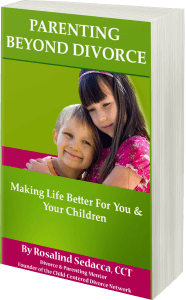By Rosalind Sedacca, CCT Communication with our children is always important, but never as essential as when they are impacted by separation or divorce. Children are vulnerable and easily frightened by changes in their routines. The more you talk to and comfort them, the less stress and anxiety they’ll experience. This is the time to reassure your children that you are taking care of matters and everyone in the family will be okay. Then, of course, take responsibility for doing what needs to be done to assure their well-being. Here are five important ways you can minimize the impact of divorce on your children to help them thrive during and after your divorce. Strive to keep as much normalcy in your children’s lives as is feasible. Maintaining relationships with friends and neighbors provides a sense of stability and continuity. Keeping children in the same school and remaining in the same
Read More
By Rosalind Sedacca, CCT We all get angry when we believe we are being wronged, misunderstood or unjustly accused. It’s a natural reaction to circumstances that put us on the defensive. For many, divorce is the perfect storm that triggers all our anger issues. When we’re parents and cannot manage our anger, it can take over our lives and affect the well-being of our children. Focusing our anger on our divorcing spouse can fuel the fire to dangerous levels for everyone involved. Anger is a feeling that alerts us that something is wrong. What we fail to understand is that we, as human beings, always have choices regarding how we act regarding those feelings. Acting before thinking can lead to mismanaged anger. Once we have reacted to anger, we have allowed our feelings to control us. This can lead to actions and behaviors we never would have taken if we
Read More
Divorce Is Tough -- Even Tougher on Teens! By Rosalind Sedacca, CDC We all know divorce is tough on families. Everyone is affected, especially the children. In most cases, the older the children, the more complex the reaction and more difficult the adaptation. There are many reasons why. Older children have a longer history in the former family unit, regardless of how healthy or toxic it has been. Perhaps they remember better times when Mom and Dad interacted with them and each other with more joy and harmony. Even if there were no good times to look back upon, older children were accustomed to the existing family dynamic, knew their place in the structure, and felt a sense of comfort in "what is. Resisting change is a natural part of being human. For teenagers that resistance is compounded by a tendency to test boundaries and rock the status quo. Divorce or
Read More
By Rosalind Sedacca, CCT Communication with our children is always important, but never as essential as when they are impacted by separation or divorce. Children are vulnerable and easily frightened by changes in their routines. The more you talk to and comfort them, the less stress and anxiety they’ll experience. Children of divorce need additional attention and support. This is the time to reassure your children that you are taking care of matters and everyone in the family will be okay. Then, of course, take responsibility for doing what needs to be done to assure their well-being. Here are five important ways you can minimize the impact of divorce on your children to help them thrive during and after your divorce. Strive to keep as much normalcy in your children’s lives as is feasible. Maintaining relationships with friends and neighbors provides a sense of stability and continuity. Keeping children in
Read More
Co-Parenting is never easy. Giving your kids a better life makes it all worthwhile! Dear Parent, Let’s face it: divorce is far more dramatic when you're a parent. While the marriage may be over, your parenting responsibilities will never end. They just change form. Now you’re a co-parent, shared parent, single parent – whatever you call it, the reality is the same: Your children still need parents who love them. But do you love your children more than you may dislike (or even hate) your Ex? Every divorced parent has to face that question. And how you answer it may well be the most important decision of your life! Why? Because it affects the emotional and psychological well-being of your children in more ways than you might imagine. Children innately love both parents. When forced to choose sides, hear one parent badmouthing the other or are exposed to ongoing parental
Read More
By Terry Gaspard, MSW, LICSW A girl stands a better chance of becoming a self-confident woman if she has a close bond with her father. A daughter’s sense of self, for instance, is often connected to how her father views her. In fact, studies show that a father’s effect on his daughter’s psychological well-being and identity is far-reaching. Research has shown that fathers play an important role in the lives of their daughters but that this relationship is the one that changes the most after divorce. While most daughters of divorce are well adjusted several years after their parents’ divorce, many have damaged relationships with their fathers. Unfortunately, if the wound is severe, a girl may grow into adulthood with low self-esteem and trust issues. What girls and women need is a loving, predictable father figure – whether or not her parents are married, single, or divorced. The following statistics
Read More
By Rosalind Sedacca, CCT Children of divorce face challenges other kids don’t have. In most cases, they don’t see Mom and Dad at the same time in the same home. They travel between homes and can spend days, weeks – even months – between visits with their other parent. Fortunately today’s technology makes life easier for these kids than ever before. Email, texting, notebooks and smart phones can build bridges with parents at a distance. But with the convenience also comes anxiety as parental stress mounts regarding how to ensure safe communication when using email and social media. Are your children being protected from spam, vulgarity, viruses and predators while on the internet, smart phones and tablets? Have you lost parental control over who they contact and what they say? Do you feel your children are safe when communicating with you, their other parent, family and friends? KidsEmail is great
Read More
By Rosalind Sedacca, CCT April 25th is the annual recognition of Parental Alienation Awareness Day. It is a time for all divorced parents to reflect on their relationship with their former spouse and how it may be subtly or overtly affecting the emotional and psychological well-being of their children. Often we rationalize our actions and decisions regarding our Ex as justified but don't focus on how it impacts our innocent children who usually are quite attached to getting love and support from both parents. One behavior commonly overlooked as a very hurtful aspect of Parental Alienation involves one parent keeping the other, target parent, from contact with the children – as punishment. Threatening To Keep Your Ex From the Kids Divorced parents can quickly learn ways to abuse their power over the other parent by using the children as a lever. Among the most harmful of these types of manipulations
Read More
By Rosalind Sedacca, CCT Children can easily and subtly be influenced by both parents during and after divorce. Sometimes the influence is intentional. Other times parents may not be aware of how they are manipulating their children’s affection and allegiance toward themselves and away from their other parent. Either way, the damage for children can be significant, especially in regards to maintaining a loving connection with both parents when the divorce is over. Here’s some sound advice for parents who feel targeted for alienation and want to re-establish or keep a healthy parent-child relationship: Keep in contact with your children in every possible way. Use video, texts, email and other technology to stay in touch, even on the most basic level. Maintain your personal power regarding scheduling activities and contact with the children. Don’t passively enable your kids or your ex to dictate terms and conditions. Create fun times worth
Read More
By Rosalind Sedacca, CCT We all do it from time to time. Make a sarcastic comment about our ex, criticize something they did or didn’t do, gesture or grimace our faces when referring to our former spouse. When we do it in front of, near or within hearing distance of our children, we set ourselves up for a hornet’s nest of problems. We have all heard this, but it’s easy to forget or let slide. It hurts our children when they hear one of their parents put down the other. This is so even if your child does not say anything about it. With rare exceptions, children innately feel they are part of both parents. They love them both even when that love isn’t returned to them in the same way. When you put down their other parent your children are likely to interpret it as a put-down of part
Read More












